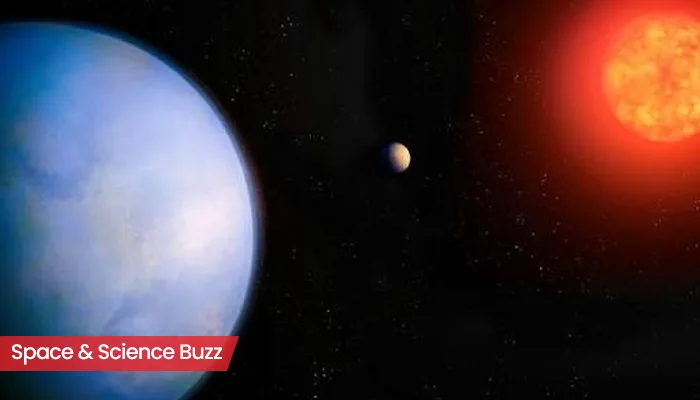.webp)
Here are today’s most important updates from the realm of Science and Space.
Cosmic Rebel: Rogue Planet Starts Acting Like a Star, Baffles Scientists
In a groundbreaking discovery, astronomers have found that a rogue planet named Cha 1107-7626 was behaving remarkably like a star. This planet is estimated to be 5-10 times bigger than Jupiter and located about 620 light-years away in the constellation Chamaeleon. Yet it doesn't orbit a star, making it a free-floating planetary-mass object. The planet is devouring gas from its surrounding disk at an astonishing rate of six billion tonnes per second, a behaviour typically seen in young stars. Cha 1107-7626's behaviour blurs lines between planets and stars, and suggests that the formation processes might be more universal than previously thought. However, the scientists suspect strong magnetic fields are driving this growth, similar to those found in stars.
New Report Reveals: A Planet-Friendly Diet Could Save Tens of Thousands Daily

A new report by the EAT-Lancet Commission suggests that if people globally adopted a plant-rich dietary pattern known as the Planetary Health Diet, it could avert as many as 40,000 early deaths each day. The diet emphasises abundant fruits, vegetables, whole grains, legumes, nuts, and a moderate intake of eggs, poultry, fish, dairy, and minimal red meat. Experts say the diet is linked to lower risks of heart disease, stroke, type 2 diabetes, certain cancers, and other noncommunicable diseases. Currently, about one-third of greenhouse gas emissions come from global food systems, while food production is also a major driver of deforestation, habitat loss, and water pollution.
Old Medicine, New Hope: Phage Therapy Fights Back Against Antibiotic Resistance

A medical treatment first used over 100 years ago may offer a solution to today's rising threat of antibiotic resistance. Phage therapy, which uses viruses known as bacteriophages to kill harmful bacteria, was widely used in the 1920s before antibiotics became the standard for treating infections. However, as bacteria continue to evolve and become resistant to existing antibiotics, researchers are now revisiting this old technique with renewed interest. The study highlights the potential of phage therapy in addressing superbugs - bacteria that no longer respond to conventional drugs. Researchers believe that with further study and development, phage therapy could become a critical tool in combating one of modern medicine's most urgent problems.
New Study Reveals: Fat Might Secretly Fuel Alzheimer’s Disease

Obesity has long been acknowledged as a risk factor for a wide range of diseases, but a more precise link between obesity and Alzheimer's disease has remained a mystery - until now. A first-of-its-kind study from Houston Methodist found that adipose-derived extracellular vesicles, tiny cell-to-cell messengers in the body, can signal the buildup of amyloid-β plaque in obese individuals. These plaques are a key feature of Alzheimer's disease. Targeting these tiny cell messengers and disrupting their communication that leads to plaque formation may help reduce the risk of Alzheimer's disease in people with obesity. The researchers said future work should focus on how drug therapy could stop or slow the build-up of Alzheimer's-related toxic proteins (such as amyloid-β) in at-risk individuals.






.webp)
.WEBP)
.WEBP)
.webp)
.webp)

